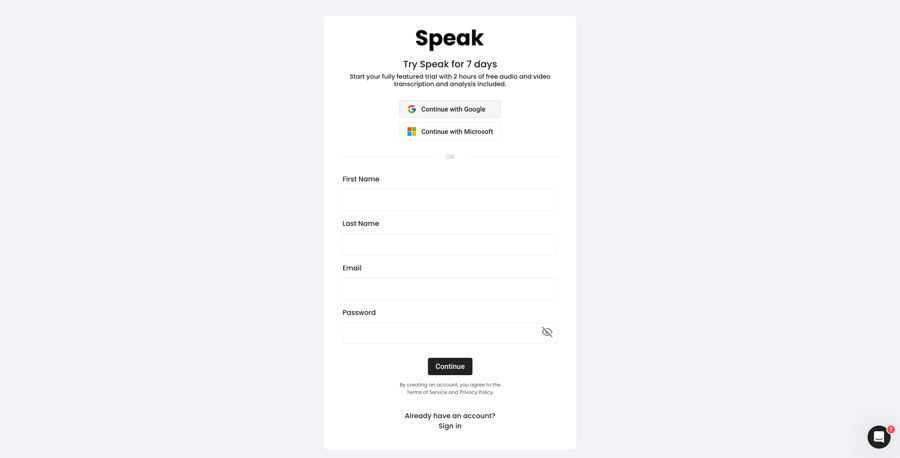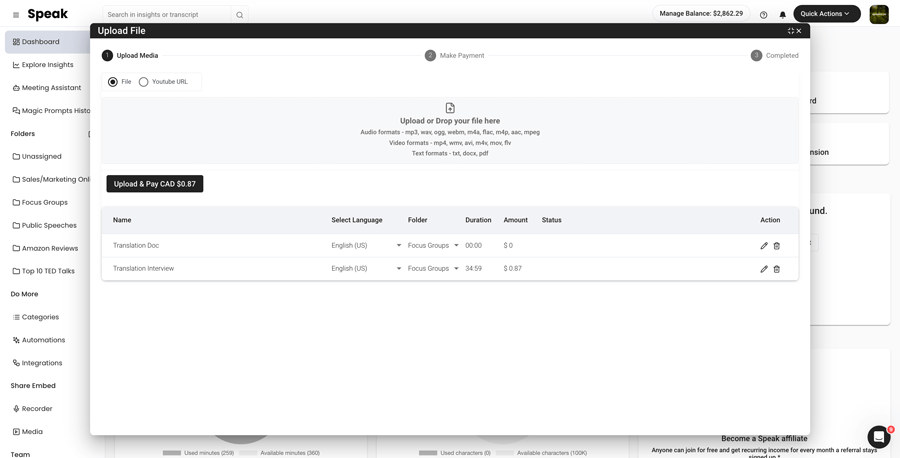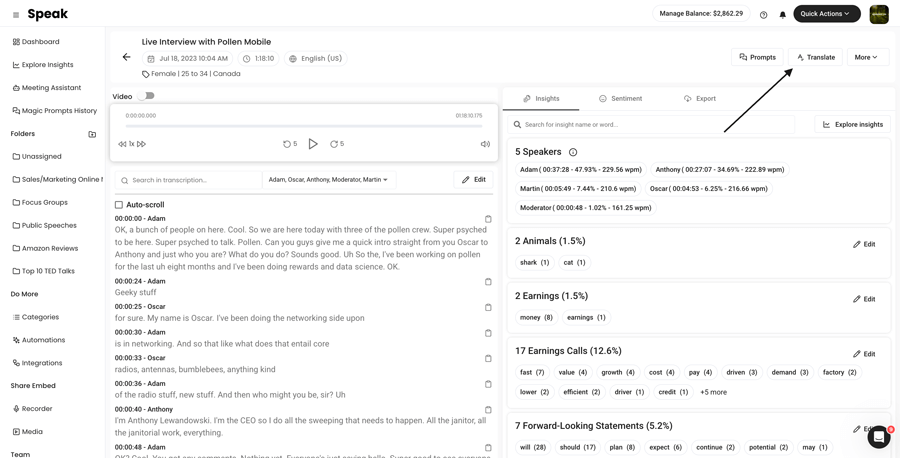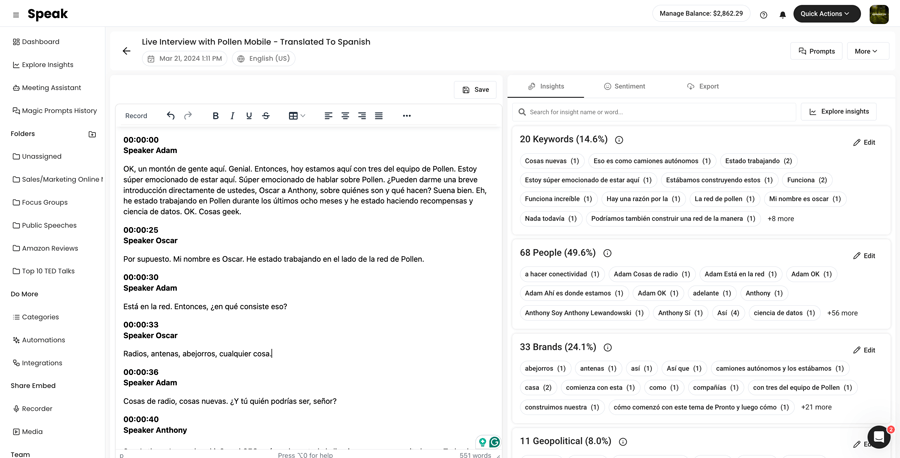How To Translate Latin to Arabic (Iraq)
Translating Latin to Arabic (Iraq) is super simple!

Step 1: Register for Speak
Register for Speak using this link.
Once you register, you can instantly begin translating your Latin to Arabic (Iraq) file(s).

Step 2: Upload Your Latin file(s)
As soon as you log in, you will be redirected to the dashboard.
Once there, you can select the Quick Action "New Upload".
In Speak, you can seamlessly upload, transcribe and translate audio, video and text files all at once!

Step 3: Translate Your Latin file(s) to Arabic (Iraq)
Once the file is uploaded, simply visit your file and select "Translate".
If it is an audio and video file, Speak will ask you if you want to keep the speaker names and timestamps in the translation.
Want to translate many files at once? No problem!
You can view the files you want to automatically translate from Latin to Arabic (Iraq) from the folder level and instantly translate as many files as you need with our artificial intelligence translation in just a few clicks.

Step 4: That's It! View, Analyze, Modify & Export Your New Arabic (Iraq) file(s)
Once the translation is done, you will be alerted and you will see a new document in the same folder your original file is in.
The file will be named the same but with a dash indicating that it is the translated version.
Need support with your Latin translation?
We are always here and happy to help at Speak!
Just send us a message on live chat on the bottom right corner and we will ensure you are set up for success.
Interested in translating Latin or other languages to different languages? View our entire list of supported translation languages here.
Automatic, accurate, instant AI translation from Latin to Arabic (Iraq) is here for you.
Register for Speak using this link and begin translating Latin to Arabic (Iraq) today.
Unlock the Power of Language: Translate Latin to Arabic (Iraq) with AI
Translating from Latin to Arabic (Iraq) represents more than just converting words; it's about bridging millennia of human culture, thought, and innovation. In this digital age, where the flow of information is ceaseless, the ability to quickly and accurately translate between these two storied languages is invaluable. Whether you're a researcher delving into ancient texts or a business seeking to expand into new markets, the solutions offered by Speak AI are designed to transcend language barriers, ultimately fostering a deeper connection and understanding across cultures.
The Revolution of AI Translation: How Speak AI is Changing the Game
Speak AI has harnessed the power of artificial intelligence, natural language processing (NLP), and large language models to create a translation tool that is not just accurate but also context-aware. With capabilities to automatically translate audio, video, and text, Speak AI's platform is a game-changer for anyone looking to convert content from Latin to Arabic (Iraq) and vice versa.
- Time and Cost Efficiency: Automatic translation significantly reduces the time and costs associated with manual translation services.
- Accuracy and Contextual Awareness: Utilizing state-of-the-art AI, Speak AI ensures translations are not only precise but also culturally and contextually relevant.
- Wide-Ranging Applications: From academic research to global business expansion, the need for reliable translation spans countless industries and fields.
Why Latin to Arabic (Iraq)? Understanding the Significance
The translation between Latin and Arabic (Iraq) serves several critical functions today, particularly in the realms of historical research, religious studies, and international diplomacy. Latin, the language of the Romans, and Arabic, with its deep roots in the history of Iraq, are carriers of vast amounts of human knowledge and culture. An accurate and nuanced translation between these languages can unlock new insights and opportunities.
Enhancing Research and Academic Studies:
For researchers, the ability to translate Latin documents into Arabic (Iraq) can reveal new perspectives on historical events, scientific texts, and philosophical works. This not just enriches academic discourse but also provides a more inclusive understanding of world history.
Expanding Business Horizons:
For businesses, the translation opens up markets and communities previously inaccessible due to language barriers. By accurately translating product information, legal documents, and marketing materials from Latin to Arabic (Iraq), companies can build trust and rapport with a whole new audience.
Locations Where Latin and Arabic (Iraq) Shine
Latin: While no longer a vernacular language, Latin is still used in religious, legal, and scientific terminology around the world. It is particularly prevalent in Vatican City and amongst scholars of medieval and renaissance texts.
Arabic (Iraq): Arabic is the sixth most spoken language worldwide, with unique dialects across different regions. The Iraqi dialect holds a special place in the Arabic-speaking world, with Iraq being a country rich with history, holding the legacy of ancient civilizations like Babylon and Assyria.
Fun Facts: Latin and Arabic (Iraq)
- Latin has influenced many modern languages, including English, and around 60% of English vocabulary has Latin or Greek roots.
- Arabic script was once used to write languages as diverse as Persian, Pashto, and Urdu, demonstrating its wide influence across centuries and cultures.
- The Library of Ashurbanipal in Iraq, dating back to the 7th century BC, is considered one of the first libraries in the world, highlighting Iraq’s long-standing contribution to knowledge and culture.
Diving Deeper: Differences and Similarities
Differences:
- Script and Direction: Latin is written in the Latin alphabet from left to right, whereas Arabic (Iraq) utilizes the Arabic script, which is written and read from right to left.
- Phonetics: The phonetic systems of Latin and Arabic are vastly different, with Arabic employing sounds that do not exist in Latin and vice versa.
Similarities:
- Lexical Borrowing: Throughout history, Arabic has borrowed terms from Latin, especially in fields like science, medicine, and philosophy.
- Rhetorical and Literary Traditions: Both languages have rich traditions of poetry, literature, and rhetoric, contributing significantly to their respective cultures’ narratives.
The Promise of Speak AI: Bridging Cultures Through Translation
Speak AI is more than a translation tool; it's your bridge to connecting with history, culture, and people. With our 4.9 rating on G2 and over 150,000 users, the effectiveness and reliability of our AI-powered solutions are evident. From providing the means to explore ancient texts to aiding businesses in thriving within new communities, Speak AI is committed to enriching lives by making language no longer a barrier but a gateway to understanding and opportunity.
Embrace the Future of Translation
As the world becomes increasingly interconnected, the value of translation, particularly from Latin to Arabic (Iraq), can't be overstated. Speak AI's revolutionary technology is at the forefront, ensuring that whether for academic research or global business strategies, your message is not just heard but truly understood.
Join Speak AI and experience the power of seamless, accurate, and context-aware translation. Dive into the depths of ancient texts, expand your business, and connect with cultures in ways never before possible. The future of translation is here, and with Speak AI, you're always one step ahead.
Translate Latin To These Other Supported Languages:
- Translate Latin-to-Afrikaans
- Translate Latin-to-Albanian
- Translate Latin-to-Amharic
- Translate Latin-to-Arabic (Egypt)
- Translate Latin-to-Arabic (Iraq)
- Translate Latin-to-Arabic (Israel)
- Translate Latin-to-Arabic (Jordan)
- Translate Latin-to-Arabic (Kuwait)
- Translate Latin-to-Arabic (Lebanon)
- Translate Latin-to-Arabic (Oman)
- Translate Latin-to-Arabic (Palestinian Authority)
- Translate Latin-to-Arabic (Qatar)
- Translate Latin-to-Arabic (Saudi Arabia)
- Translate Latin-to-Arabic (Syrian Arab Republic)
- Translate Latin-to-Arabic (United Arab Emirates)
- Translate Latin-to-Arabic Modern Standard (Bahrain)
- Translate Latin-to-Armenian
- Translate Latin-to-Assamese
- Translate Latin-to-Aymara
- Translate Latin-to-Azerbaijani
- Translate Latin-to-Bambara
- Translate Latin-to-Basque
- Translate Latin-to-Belarusian
- Translate Latin-to-Bengali
- Translate Latin-to-Bhojpuri
- Translate Latin-to-Bosnian
- Translate Latin-to-Bulgarian
- Translate Latin-to-Catalan
- Translate Latin-to-Cebuano
- Translate Latin-to-Chinese (Simplified)
- Translate Latin-to-Chinese (Traditional)
- Translate Latin-to-Corsican
- Translate Latin-to-Croatian
- Translate Latin-to-Czech
- Translate Latin-to-Danish
- Translate Latin-to-Dari
- Translate Latin-to-Dhivehi
- Translate Latin-to-Dogri
- Translate Latin-to-Dutch
- Translate Latin-to-English
- Translate Latin-to-English (Australia)
- Translate Latin-to-English (Indian)
- Translate Latin-to-English (Irish)
- Translate Latin-to-English (New Zealand)
- Translate Latin-to-English (Scottish)
- Translate Latin-to-English (South African)
- Translate Latin-to-English (United Kingdom)
- Translate Latin-to-English (United States)
- Translate Latin-to-Esperanto
- Translate Latin-to-Estonian
- Translate Latin-to-Ewe
- Translate Latin-to-Farsi (Persian)
- Translate Latin-to-Filipino Tagalog
- Translate Latin-to-Finnish
- Translate Latin-to-French
- Translate Latin-to-French (Canada)
- Translate Latin-to-Frisian
- Translate Latin-to-Galician
- Translate Latin-to-Georgian
- Translate Latin-to-German
- Translate Latin-to-German (Swiss)
- Translate Latin-to-Greek
- Translate Latin-to-Guarani
- Translate Latin-to-Gujarati
- Translate Latin-to-Haitian Creole
- Translate Latin-to-Hausa
- Translate Latin-to-Hawaiian
- Translate Latin-to-Hebrew
- Translate Latin-to-Hindi
- Translate Latin-to-Hmong
- Translate Latin-to-Hungarian
- Translate Latin-to-Icelandic
- Translate Latin-to-Igbo
- Translate Latin-to-Ilocano
- Translate Latin-to-Indonesian
- Translate Latin-to-Irish
- Translate Latin-to-Italian
- Translate Latin-to-Japanese
- Translate Latin-to-Javanese
- Translate Latin-to-Kannada
- Translate Latin-to-Kazakh
- Translate Latin-to-Khmer
- Translate Latin-to-Kinyarwanda
- Translate Latin-to-Konkani
- Translate Latin-to-Korean
- Translate Latin-to-Krio
- Translate Latin-to-Kurdish
- Translate Latin-to-Kurdish (Sorani)
- Translate Latin-to-Kyrgyz
- Translate Latin-to-Lao
- Translate Latin-to-Latin
- Translate Latin-to-Latvian
- Translate Latin-to-Lingala
- Translate Latin-to-Lithuanian
- Translate Latin-to-Luganda
- Translate Latin-to-Luxembourgish
- Translate Latin-to-Macedonian
- Translate Latin-to-Maithili
- Translate Latin-to-Malagasy
- Translate Latin-to-Malay
- Translate Latin-to-Malayalam
- Translate Latin-to-Maltese
- Translate Latin-to-Maori
- Translate Latin-to-Marathi
- Translate Latin-to-Meiteilon (Manipuri)
- Translate Latin-to-Mizo
- Translate Latin-to-Mongolian
- Translate Latin-to-Myanmar (Burmese)
- Translate Latin-to-Nepali
- Translate Latin-to-Norwegian
- Translate Latin-to-Nyanja (Chichewa)
- Translate Latin-to-Odia (Oriya)
- Translate Latin-to-Oromo
- Translate Latin-to-Pashto
- Translate Latin-to-Persian
- Translate Latin-to-Polish
- Translate Latin-to-Portuguese
- Translate Latin-to-Portuguese (Brazilian)
- Translate Latin-to-Portuguese (Portugal)
- Translate Latin-to-Punjabi
- Translate Latin-to-Quechua
- Translate Latin-to-Romanian
- Translate Latin-to-Russian
- Translate Latin-to-Samoan
- Translate Latin-to-Sanskrit
- Translate Latin-to-Scots Gaelic
- Translate Latin-to-Sepedi
- Translate Latin-to-Serbian
- Translate Latin-to-Sesotho
- Translate Latin-to-Shona
- Translate Latin-to-Sindhi
- Translate Latin-to-Sinhala
- Translate Latin-to-Sinhala (Sinhalese)
- Translate Latin-to-Slovak
- Translate Latin-to-Slovenian
- Translate Latin-to-Somali
- Translate Latin-to-Spanish
- Translate Latin-to-Spanish (Mexico)
- Translate Latin-to-Sundanese
- Translate Latin-to-Swahili
- Translate Latin-to-Swedish
- Translate Latin-to-Tajik
- Translate Latin-to-Tamil
- Translate Latin-to-Tatar
- Translate Latin-to-Telugu
- Translate Latin-to-Thai
- Translate Latin-to-Tigrinya
- Translate Latin-to-Tsonga
- Translate Latin-to-Turkish
- Translate Latin-to-Turkmen
- Translate Latin-to-Twi (Akan)
- Translate Latin-to-Ukrainian
- Translate Latin-to-Urdu
- Translate Latin-to-Uyghur
- Translate Latin-to-Uzbek
- Translate Latin-to-Vietnamese
- Translate Latin-to-Welsh
- Translate Latin-to-Xhosa
- Translate Latin-to-Yiddish
- Translate Latin-to-Yoruba
- Translate Latin-to-Zulu



